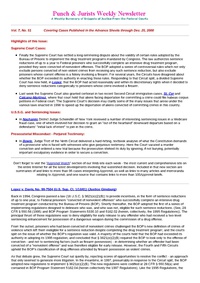Here the Court vacated a murder conviction and ordered a new trial because the prosecution shirked its duty by ignoring, if not burying, potentially important exculpatory evidence in order to secure a conviction and outlined the law on the use of perjury.
In this hard hitting decision on …
"Never has it been more true than it is now that a criminal charged with a serious crime understands that a fast and easy way out of trouble with the law is not only to have the best lawyer money can buy or the court can appoint, but to …
Here the district court granted an unusual "out-of-the-heartland" departure in a Medicare fraud case based on findings that the defendants were "accidental criminals" whose “initial lack of intent” to join in the crime justified a departure.
This case involved the prosecution of eight defendants, six of whom were …
Here the Supreme Court held that the BOP had acted within its discretionary right when is adopted revised regulations excluding persons whose crime involved a gun from receiving sentence reductions for participation in drug treatment programs.
Back in 1994, Congress passed a law (18 U.S.C. § 3621(e)(2)(B)) to …
Here, Judge Loken objected to the majority's rather routine approval of a sentence enhancement for the defendant, an accountant, based on his "use of his special skills" as a CPA to effectuate the money laundering offense for which he was convicted. Judge Loken stated: "The [majority] frames the issue …
Here the Court held that pleading guilty within 4 days of the return of a second superseding indictment was not sufficiently timely to warrant granting the defendant a the one-level reduction under USSG § 3E1.1(b)(2) since it was still the brink of trial.
In this case the defendant …
Here the Court agreed that it was error under Apprendi for the district court to impose a sentence exceeding 20 years under 21 USC § 841(b)(1)(C) - but held that it could "stack" consecutive sentences under the provisions of USSG § 5G1.2(d).
In this case the Sixth Circuit …
Plaintiff appealed the orders of the United States District Court for the Southern District of New York, which dismissed plaintiff's civil rights action against four defendant prison officials. Three defendant prison officials appealed the denial of their motions for summary judgment.
Plaintiff brought a pro se action claiming that …
St. Cyr v. I.N.S., 229 F.3d 406 (2nd Cir. 2000) (Judge Oakes)
Calcano-Martinez v. I.N.S., 232 F.3d 328 (2nd Cir. 2000) (Judge Oakes)
On January 12, 2001, the Supreme Court agreed to grant certiorari in both of these immigration/deportation cases almost before the ink was dry on the published …
In this case the Second Circuit addressed for the first time the question of whether fraud and tax evasion counts should be grouped under the Guidelines. Consistent with the holdings of several other district courts to have considered this question, Southern District Judge Richard Owen had held that such …
